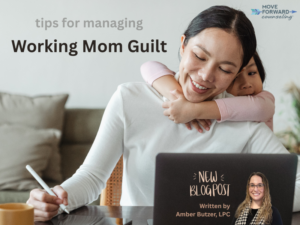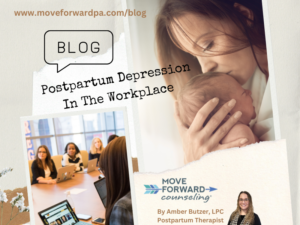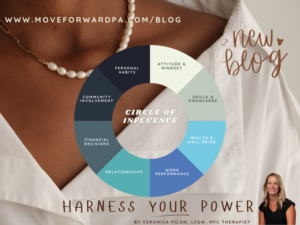The holidays can be a stressful time for anyone. For those with a history of trauma, it can be a major trigger, causing many trauma-related symptoms. Besides closing yourself off from the world and ignoring the season altogether, what are some healthier ways you can cope with traumatic events this holiday season?
First off, if you are struggling with traumatic events or mental health consider seeking the help of a licensed counselor, therapist, or mental health professional. Online therapy can be a great tool to access the help you need from anywhere. At Move Forward, we serve clients from around the state of Pennsylvania.
Stick to Your Routine
During the holiday season, we want to kick back, relax, and let go of routines. But, routines are important in keeping your mental health in check. Do your best to maintain your usual sleep, eating, exercise, and self-care schedule during the holidays and beyond.
Sleep
Late nights shopping, wrapping gifts, cooking, traveling, and partying are common during the holiday season. But, sleep is so important. Getting the proper amount of sleep is the body’s number one tool for keeping trauma symptoms at bay. Without the necessary amount of sleep (7-9 hours a night for the average adult) you are leaving your body unequipped to handle the triggers related to traumatic events and stressors of the day ahead.
That being said, it can be hard to keep a sleep routine when traveling and hosting visitors. Do your best to plan ahead in these situations. Bring oil diffusers, pillows, blankets, and stick to your normal bedtime routine. If you usually shower before bed, continue to do the same. If you read for a bit in bed, stick to it.

Limit alcohol, sugar, and caffeine
The holidays are a time for indulgence in all the tasty things we enjoy but too much can cause us to feel worse. Alcohol and coffee are stimulants that can mess up our sleep schedules and routines. Your nervous system is likely already on high alert with all the changes to your normal day-to-day. Adding alcohol and caffeine is only going to stimulate your nervous system even more, increasing trauma-related symptoms.
Plan ahead of time. How many sugary desserts, cups of coffee, or glasses of wine are you going to allow yourself at a gathering? Bring other, healthier, options you enjoy for a replacement such as soda waters, kombucha, or herbal teas. That way you aren’t caught off guard.
Keep up with self-care
The holidays are so busy we often let go of self-care. Who has time to go to the gym, take a walk, or soak in a bath? Instead of viewing these things as optional tasks in your life, think of them as necessary. Self-care is necessary for maintaining your mental health and keeping trauma symptoms away. It shouldn’t be the first thing to cross off your to-do list, instead, allow yourself to say “no” to that work gathering or give yourself permission to show up late or leave early.
Set boundaries with family
’Tis the season for family and with that family drama. If you are struggling with the impact of past traumatic events, chances are your family is either a trigger or a source of those traumatic memories. You can choose to limit your contact with triggers. That might mean avoiding family events or spending reduced time with those who cause you stress.
You can also plan ahead. Talk through scripts in your head of what you might say to certain comments, how will you respond? Have an exit plan. Always drive yourself so that you are in control of when you leave. If there is a specific location you wish to avoid, consider planning a different family outing or creating new memories.
Give yourself time and space to grieve
Grief is a common part of trauma and the holiday season. It comes and goes sometimes unexpectedly. Allow yourself to process grief. Trying to ignore it will only make it worse. Talk to yourself, lean on trusted friends, family, counselors, or therapists. Understand that grief is temporary and it will pass. Use this time to journal, meditate, or write letters to those who have hurt you or those you have lost.

Get help
If you are struggling with processing trauma, coping with grief, or other mental health issues this holiday season and beyond consider seeing a licensed counselor or therapist. They can help give you the tools to work through life’s challenges and get you back to feeling your best.
Ready to begin counseling in Pennsylvania?
At Move Forward, our professionally-trained and licensed counselors have openings. Just call our office at 717-462-7003×1 and speak to our administrative assistant to get started to feeling better. You can get the tailored help you need right now. We are here.




























